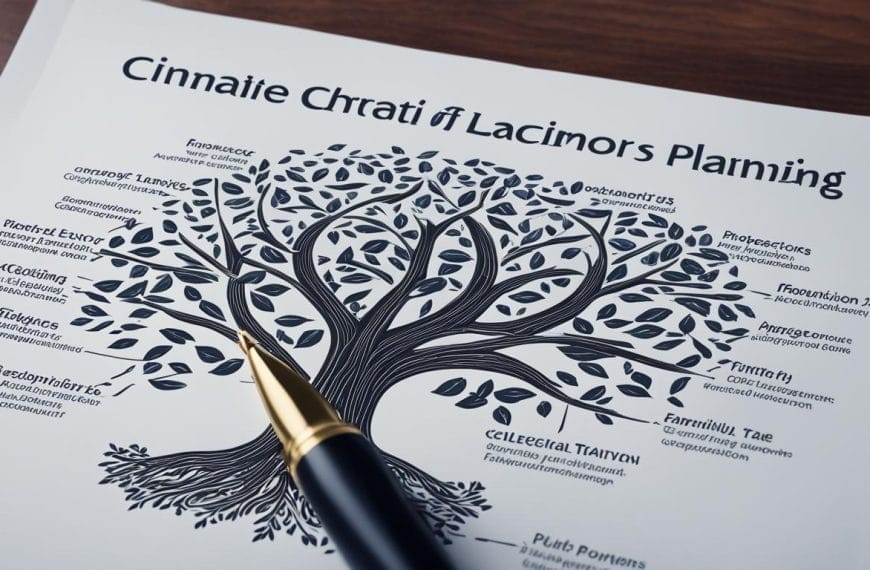Are you wondering why estate planning is important? Well, let’s dive right in! Estate planning is a critical financial responsibility that allows you to secure your legacy and provide for your loved ones. By making arrangements and decisions regarding your assets and affairs, you can ensure that your wishes are carried out even after you’re no longer here.
So, what are the benefits of estate planning? Firstly, it gives you control over who gets what. By clearly outlining your intentions, you can prevent any potential family conflicts and ensure that your assets are distributed according to your wishes. Estate planning also covers important aspects like determining who will make decisions on your behalf if you become incapacitated and who will take care of your children.
Moreover, estate planning allows you to address specific healthcare wishes. Through tools like Living Wills (Advanced Directives) and Medical Power of Attorney, you can ensure that your medical decisions are made by someone you trust. This brings peace of mind not only to you but also to your family.
So, why is estate planning important for everyone? Regardless of your financial status or age, having an estate plan is crucial. Without one, your assets may not be distributed as you desire, potentially leaving your loved ones in a difficult situation. Estate planning also helps you avoid the probate process, minimize estate taxes, and protect your legacy.
Now that you understand the importance of estate planning, it’s time to take action. Start the process as early as possible, and consult professionals to guide you through the complexities. By creating a well-crafted estate plan, you can secure your legacy and have peace of mind knowing that your loved ones will be provided for according to your wishes.
Understanding Estate Planning
Estate planning is an essential process that involves making arrangements and decisions regarding your assets and personal affairs. It enables you to address important questions such as who will inherit your assets, who will make decisions on your behalf if you become incapacitated, and how you wish to be cared for in case you are unable to look after yourself.
An estate plan is necessary for individuals who own property, vehicles, have children, specific healthcare wishes, or want to minimize family conflicts. By implementing various strategies and tools, you can create a comprehensive estate plan that reflects your wishes and protects your assets and loved ones.
Estate Planning Tools and Strategies
There are several estate planning tools that can help you achieve your goals. These include:
- Last Will and Testament (Will): A legal document that outlines how you want your assets to be distributed after your death.
- Living Trust: A legal arrangement that allows you to transfer your assets to a trust and designate a trustee to manage and distribute them according to your wishes.
- Living Will (Advanced Directive): A document that specifies your healthcare wishes in the event you are unable to communicate them.
- Financial Power of Attorney: A legal document that grants someone the authority to make financial decisions on your behalf.
- Medical Power of Attorney: A legal document that designates someone to make medical decisions on your behalf if you are unable to do so.
By considering these tools and strategies, you can create an effective estate plan that ensures your assets are protected, your wishes are honored, and your loved ones are taken care of.
| Benefits of Estate Planning | Estate Planning Checklist |
|---|---|
|
|
Why Do Estate Planning? The Importance for Everyone
Estate planning is not just for the wealthy; it is crucial for people of all financial backgrounds. Having an estate plan in place ensures that your wishes are carried out and your loved ones are provided for in the best possible way. Without a plan, your assets may not be distributed according to your wishes, leaving your family in a difficult and uncertain situation.
One of the key benefits of estate planning is the ability to avoid the lengthy and costly probate process. By establishing a clear plan, you can streamline the distribution of your assets and minimize the potential for disputes among family members.
Estate planning also allows you to make important medical decisions in advance through healthcare directives. By creating documents like a living will or health care power of attorney, you can ensure that your wishes regarding medical treatment and end-of-life care are known and respected.
In addition to protecting your interests during your lifetime, estate planning can also help minimize estate taxes, ensuring that more of your assets go to your loved ones rather than to the government.
Essential Components of an Estate Plan
- A Last Will and Testament establishes how your assets will be distributed after your passing.
- Trusts provide a way to manage and distribute assets while avoiding probate.
- A Power of Attorney allows you to appoint someone you trust to make financial and legal decisions on your behalf.
- Beneficiary Designations ensure that your assets are transferred to the intended recipients.
- An Asset Inventory helps keep track of all your assets, making the estate planning process smoother.
By taking the time to create a comprehensive estate plan, you can bring peace of mind to yourself and your loved ones. Your legacy will be preserved, and your wishes will be honored, providing a secure foundation for the future.
| Benefits | Explanation |
|---|---|
| Protects your assets | Ensures your assets are distributed according to your wishes and minimizes family conflicts. |
| Avoids probate | Helps your loved ones avoid the lengthy and expensive probate process. |
| Provides healthcare directives | Allows you to make important medical decisions in advance, ensuring your wishes are followed. |
| Minimizes estate taxes | Helps preserve more of your assets for your loved ones. |
When Should You Start Estate Planning?
Life is unpredictable, and it’s never too early to begin planning for the future. Estate planning is a crucial step in securing your legacy and ensuring that your assets and loved ones are protected. Whether you have dependents or substantial assets, starting the estate planning process early offers numerous advantages. By taking proactive steps today, you can have peace of mind and prepare for the unexpected.
Initiate Open Conversations
One of the first steps in estate planning is initiating open conversations with your family members. Discuss your wishes and expectations to ensure that everyone is on the same page. These conversations can help you understand your loved ones’ needs and concerns, allowing you to tailor your estate plan accordingly. By involving your family in the estate planning process, you can minimize potential conflicts or misunderstandings that may arise in the future.
Take Inventory of Your Assets and Debts
An important aspect of estate planning is taking inventory of your assets and debts. Create a comprehensive list of your properties, investments, bank accounts, and any other valuable assets you may have. Additionally, make note of your outstanding debts, such as mortgages or loans. This inventory will serve as a foundation for creating an effective estate plan and help determine how you want your assets to be distributed.
Create Essential Legal Documents
Creating essential legal documents is a critical part of estate planning. These documents ensure that your wishes are known and can be carried out if needed. Some key legal documents to include in your estate plan are:
- Will: A will outlines how you want your assets to be distributed and specifies guardianship for minor children.
- Trusts: Trusts provide a mechanism for managing and distributing your assets according to your instructions, while potentially avoiding probate and maintaining privacy.
- Powers of Attorney: Powers of attorney designate individuals to make financial and healthcare decisions on your behalf if you become incapacitated.
Having these legal documents in place ensures that your wishes are respected and helps avoid potential complications or disputes in the future.
Starting the estate planning process early gives you the opportunity to carefully consider your wishes and make any necessary adjustments as your life circumstances change. It’s important to regularly review your estate plan and update it accordingly to reflect any significant life events, such as marriage, divorce, the birth of a child, or the acquisition of new assets.
Now that you understand the importance of estate planning and the benefits of starting early, you can take the necessary steps to protect your legacy. Consult with professionals, such as estate planning attorneys or financial advisors, who can provide guidance and ensure that your estate plan aligns with your goals and priorities.
The Benefits of Early Estate Planning
Early estate planning is a proactive strategy that can yield numerous advantages for you and your loved ones. By taking the necessary steps ahead of time, you can ensure the protection of your assets and the implementation of your wishes. Here are some key benefits of early estate planning:
1. Asset Distribution
With early estate planning, you can establish a clear roadmap for the distribution of your assets according to your preferences. By documenting your wishes in legal documents like a Last Will and Testament or a Living Trust, you can ensure that your loved ones receive their rightful inheritance.
2. Healthcare Decision-Making
Early estate planning allows you to designate a trusted individual to make medical decisions on your behalf if you become incapacitated. By executing a healthcare power of attorney, you can ensure that your healthcare preferences are respected and that someone who understands your wishes will be making medical choices for you.
3. Avoiding Probate
One of the significant advantages of early estate planning is the ability to minimize or entirely avoid the probate process. This can save your loved ones both time and money, as probate can be a lengthy and expensive legal procedure. By utilizing tools such as a Living Trust or beneficiary designations, you can help your assets pass directly to your beneficiaries without going through probate.
4. Minimizing Estate Taxes
Another benefit of estate planning is the opportunity to minimize estate taxes. Through strategic planning and the use of various estate planning strategies, you can reduce the burden of estate taxes on your assets, ensuring that more of your wealth goes to your intended beneficiaries.
5. Maintaining Control
Starting estate planning early gives you the power to maintain control over your assets and affairs. By specifying your preferences in legal documents, you can dictate how your assets should be managed and distributed. This provides peace of mind, knowing that your wishes will be honored, and it can also help prevent potential disputes among family members.
| Benefits of Early Estate Planning | Description |
|---|---|
| 1. Asset Distribution | Establish a clear plan for distributing assets to your chosen beneficiaries. |
| 2. Healthcare Decision-Making | Designate a trusted individual to make medical decisions on your behalf. |
| 3. Avoiding Probate | Minimize or avoid the time-consuming and costly probate process. |
| 4. Minimizing Estate Taxes | Strategically plan to reduce estate taxes on your assets. |
| 5. Maintaining Control | Maintain control over your assets and affairs, preventing disputes. |
Starting estate planning early is a wise decision that ensures your wishes are carried out, minimizes complications, and provides security for your loved ones. Remember to review and update your estate plan periodically to reflect any changes in your life circumstances or legal requirements.
Conclusion
Estate planning is a crucial step that everyone should take to protect their legacy and provide for their loved ones. Regardless of your age or financial status, having an estate plan in place is essential. By understanding the basics of estate planning and consulting with professionals, you can ensure that your assets are preserved and your wishes are honored.
Starting the estate planning process as early as possible is recommended, as it allows you to navigate the complexities of planning and make informed decisions. By creating a comprehensive estate plan, you can secure your legacy and have peace of mind, knowing that your loved ones will be taken care of in accordance with your wishes.
If you have any questions or need guidance, don’t hesitate to consult with estate planning professionals who can provide the necessary expertise and guidance. Estate planning might seem overwhelming, but with the right support, you can create a well-crafted estate plan that aligns with your goals and priorities. Take the first step towards securing your future today by prioritizing estate planning and ensuring that your loved ones are protected.













